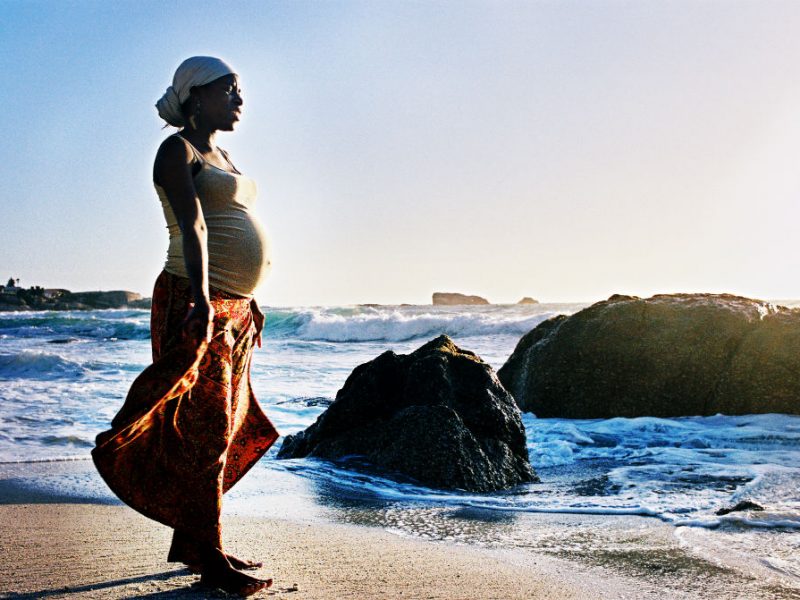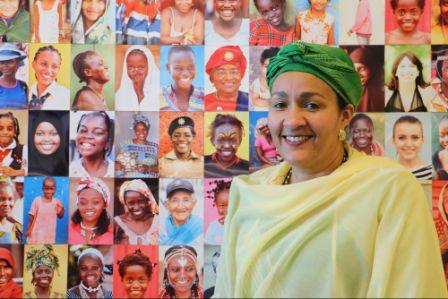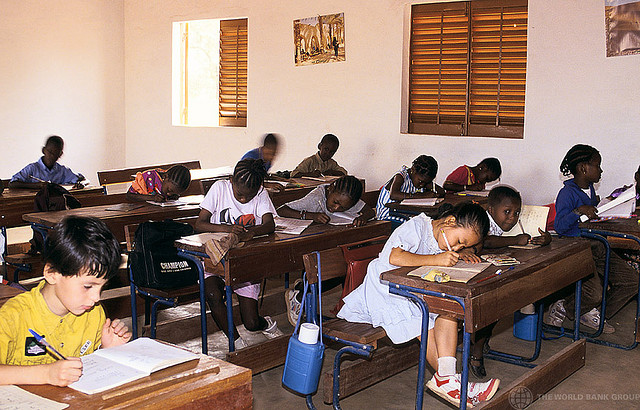Sierra Leone’s school-time blues
How are the Millennium Development Goals playing out across Africa? In the first of a series assessing their impact, we asked the talented blind musician Sorie Kondi to travel around Sierra Leone to find out what schoolchildren, like his own daughter, are experiencing. Sorie Kondi wanders the streets of Freetown, Sierra Leone, a blind man asking for cash in a city with its own problems. (Blind busker Sorie Kondi plays to locals in Sierra Leone)
Life on the edge
The eight Millennium Development Goals world leaders signed up to in 2000 were aimed at cutting hunger and killer diseases, guaranteeing all children an education and empowering women.
With five years left to go to achieve them, what’s the picture like today? The new five-part Life on the Edge series takes a look at what’s happening on the MDGs in countries across Africa. The films were made for the BBC by tve
Sorie needs US$8 a month to pay his rent, plus a few dollars more to help his 14-year-old daughter Zeinab pay for the “extras” at school. His wife Sally, who is also blind, helps out by making soap.
Sorie is a busker, crunching sad tunes with a thumb piano – known as the kondi – and a beaten-up amp.
Sorie, whose music is available as a digital download from iTunes, is known as Sierra Leone’s Stevie Wonder.
His blues inspiration is daughter Zeinab. Many girls like Zeinab are doing just fine. Sierra Leone is making undoubted progress towards the Millennium Development Goals, which include girls’ rights, and free primary schooling for all.
But if it was that simple, Sorie would be spending more time in the studio taking a bet on the future, rather than busking for spare leones.
Sorie has been picking up troubled stories about girls’ schooling. Education is not just about money and buildings, which are easily measured for the MDGs. Zeinab’s cousins have all left school early because of pregnancy. And Sorie is worried about his daughter’s future.
‘Ghost teachers’
He has hardly been outside Freetown since the end of the decade-long civil war eight years ago, in which both his parents were killed.
Sorie busks to help pay for extras for his daughter
So we asked Freetown’s electronic troubadour, and his 20-year-old minder and colleague Foday, to take a minstrel’s journey around Sierra Leone.
On the road to his home in Mangay Loko, Sorie meets Theophilus, a primary school teacher who needs a lift. What’s making him angry? Ghost teachers. It is estimated the Sierra Leone government has been paying the salaries of 30,000 teachers who don’t exist. No-one seems to know where the money is going.
“Teachers do retire, some die,” Theophilus says. “But heads of schools still maintain their names in the register. So there are ghost teachers all over.”
Back in Freetown, Sorie will learn the government has started a roll call of teachers to make sure the money is spent properly. Sorie’s van passes schoolgirls beautifully turned out in crisp uniforms. It is a long walk to school, maybe many kilometres. Even though it is free, more than a quarter of a million children – mostly girls – do not go to primary school. Some 12,000 schools were destroyed during the civil conflict.
Unqualified and untrained
In Mangay Loko, Sorie is a success story. So is his old friend Hassan – almost. Hassan used to be a small-time trader. Now he’s a teacher. But like almost half Sierra Leone’s teachers he’s a “UU” or “Unqualified Untrained” teacher. The village pays him what it can, so he is also “Usually Underpaid” or even “Unpaid”.
Hassan has been waiting three years to take up a training place
There is little incentive for Hassan to train as a teacher. There are just not enough well-paid jobs, although the government is reviewing teachers’ pay.
Hassan was accepted onto a training programme three years ago, but he is still waiting for confirmation of funding.
Next, Sorie heads to Mateboi with Mohamed, a motorbike taxi driver and former student of one of the oldest schools in Sierra Leone.
It has an impressive list of former pupils, including some public figures, and has recently seen a huge increase in its pupil intake.
There are now 425 students – but only five teachers and three classrooms. Many lessons are held under mango trees. When the rain comes, the children pile into the school buildings bringing the entire school to a halt.
“If you could see them,” Foday tells Sorie, “you would see that the children have no desks and have to put the books on their laps.”“If you could see them, you would see that the children have no desks and have to put the books on their laps” Foday Sorie’s minder
“So, no benches then?” Sorie asks.
“They do have benches to sit on but they haven’t got anything to write on.
Sorie turns to the headmaster: “Mr Headmaster, these people in high place, what have they done to help the school?”
“These people have not made any effort to move us from under the mango tree,” he headmaster replied.
“Forget the government, it’s up to local people to move these children into classrooms. I had a better education than them because we had the facilities in school. In those days, we had enough desks to write on. These days, children use their lap to write on. That doesn’t help their writing skills.”
Pregnant schoolgirls
Sixteen-year-old Mammy Musa, her mother and stepfather, need a lift back to their village. Foday asks Mammy Musa how many cases of pregnancy had she heard of since she started school.
“Many,” she replied. “More than 40 – more than 50.” “Are these cases you really know?
I don’t want you to lie,” says Foday.
“It’s not a lie,” Mammy Musa says.
In Kenema, the country’s diamond-trading centre in eastern Sierra Leone, Sorie and Foday meet Juliette, a primary school teacher, volunteer radio journalist, and single mother. She runs a youth programme and opens the phone lines every Saturday morning.
This girl got pregnant while she was still at school
“Most questions that used to come to our studio, whenever I’m presenting this programme, people say the teenagers themselves are responsible for the problems they face,” she says.
“They want to live big, they want to live with all opportunities. So most of the time they choose to go to the street and just live their own life. I’ll blame the parents, the guidance, I’ll blame the teenagers, themselves. Then I’ll blame also the schools that these teenagers are attending.”
These are not comfortable messages for the father of a 14-year-old girl.
And there is more to come from a boatman transferring tourists to Tiwai Island, Sierra Leone’s river island wildlife sanctuary.
He has spent a lot of money on his daughter’s secondary education. As a result, her “belly business”, or pregnancy, has been a disappointment – particularly as she says it involved her teacher.
“I was going to school and I suddenly get pregnant,” his daughter tells Sorie and Foday. “I was in love with my teacher a long time. Since I was in Form One. He helped me pass my exams and paid for my practical fees and other things. When I told him that I was pregnant, he said, ‘Don’t tell me that.’
“He said if I was willing, he had the money, I could have an abortion. I said, ‘No’, because some friends have died because of abortion.”
Back in Freetown, Sorie reflects on his recent experiences.
“Zeinab’s my child, but she has a mind of her own,” he says. “Even though I really hope she finishes her studies, it’s up to her. I am praying to God that she finishes her education because I believe it will be good for her. If I get money I will send her to college. I believe God will provide.”
The MDGs are meant to be measurable and, on some counts, countries like Sierra Leone are making progress.
But our 21st Century troubadour has returned home with an old bluesman’s message: “That life is messier, and more troublesome, and money alone won’t always fix things.”
By Steve Bradshaw Sierra Leone
Stay with Sierra Express Media, for your trusted place in news!
© 2010, https:. All rights reserved.









